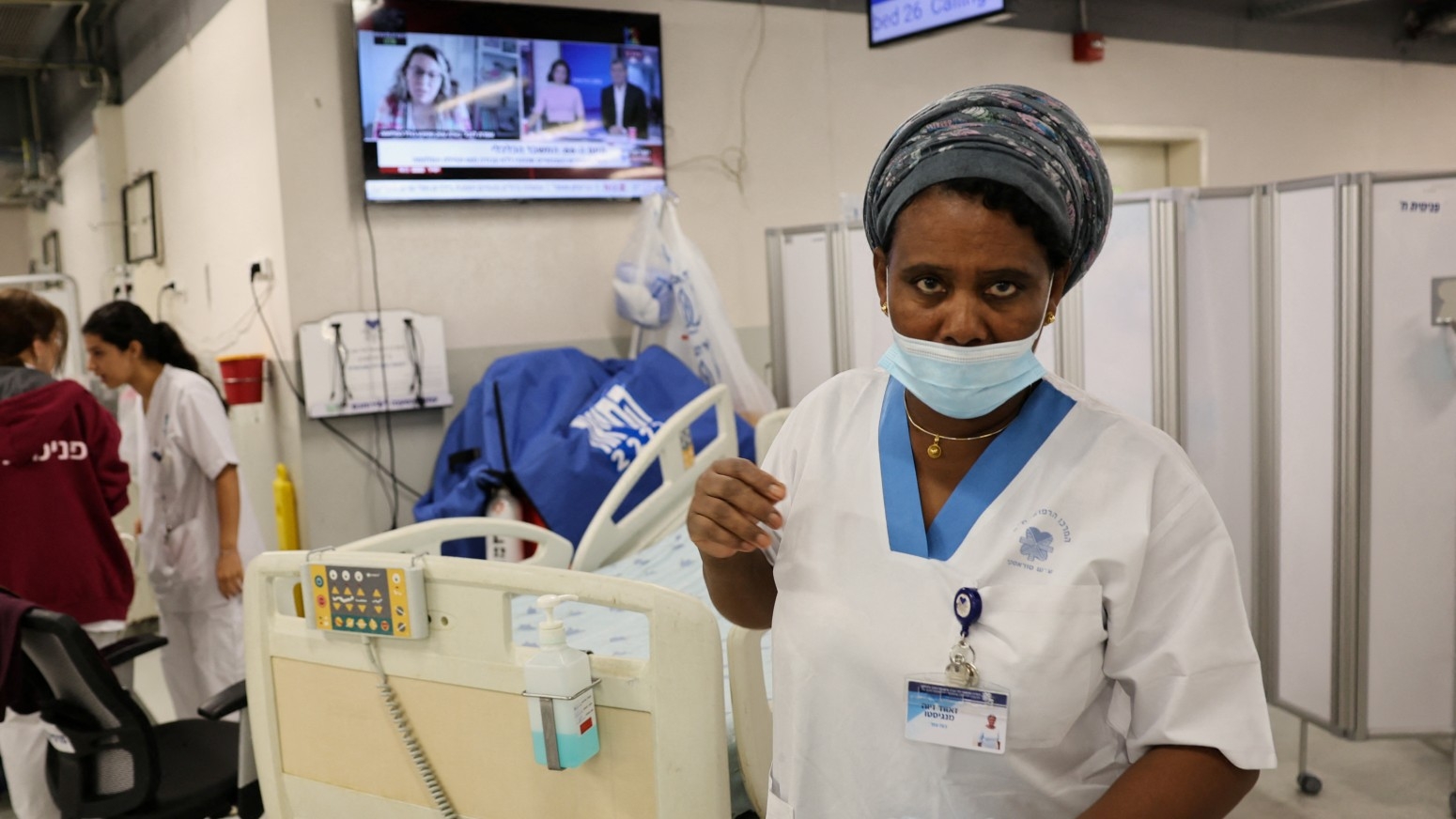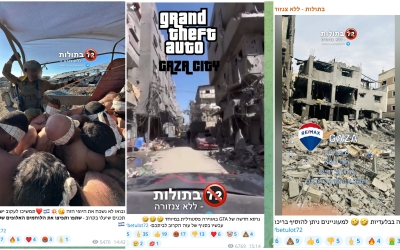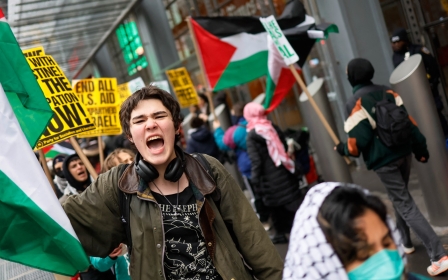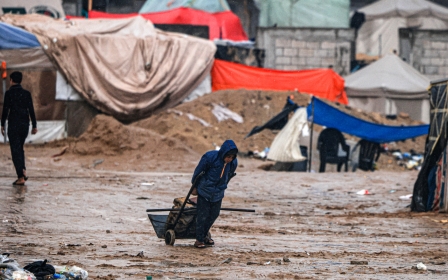Palestinian accused of blocking Israeli colleague on social media arrested by police

A Palestinian trainee doctor was arrested, banned from Israel and is now unable to work after being accused of blocking colleagues on social media.
The Palestinian, who is from the occupied West Bank city of Nablus and renowned as a brilliant and diligent medic, says she did not even have any active social media accounts in the first place.
She was not charged with any offence.
She had been working at Tel Aviv’s Tel HaShomer Hospital, also known as the Sheba Medical Center, for three years as a trainee doctor. Before becoming a trainee, she volunteered at the hospital for a year to help during the pandemic.
Middle East Eye is withholding her name for security reasons.
New MEE newsletter: Jerusalem Dispatch
Sign up to get the latest insights and analysis on Israel-Palestine, alongside Turkey Unpacked and other MEE newsletters
"It is very difficult," she told MEE. "The hardest thing is that I lost my job just because someone filed a complaint against me because he only suspected something."
The Palestinian trainee doctor’s case is one of several instances where Palestinians - both citizens of Israel and from the occupied territories - and left-wing Jewish Israelis have been targeted for their social media use following the 7 October Hamas-led attack.
On 23 October, the Israeli police arrived at the hospital asking several people where she was.
“Everyone looked at me as if I was a criminal,” she recalled.
The police told her that they wanted her for questioning, without giving any reason. They confiscated her mobile phone and searched through her bag, before leading her into a car outside the emergency department.
“When I arrived at the police headquarters, they asked me if I knew how to speak Hebrew. I told them that I spoke Hebrew in medical terms, so I asked for a lawyer to be present, but they refused,” she recalled.
'I hadn't blocked anyone'
A police officer interrogated the trainee doctor, asking how long she intended to work at the hospital and when she would return to Nablus.
“Then she asked me about my relationship with my colleagues and I answered that everything was normal with no problems, and for them I was one of the most skilled doctors there, and that the department in which I was studying the specialty asked me to work for them after completing the training,” she said.
“She asked me what happened recently. I didn’t understand her question. She said, ‘why did you block some of your colleagues on social media?’ I told her that I hadn’t blocked anyone.”
The trainee doctor was then told that someone had filed a complaint that she had blocked him on social media.
“So I told her that in August I deleted all my social media accounts, such as Facebook and Instagram, from my phone because I wanted to focus on my studies,” she said.
Follow Middle East Eye's live coverage for the latest on the Israel-Palestine war
“I didn’t understand why there would be a problem if I wanted to block anyone from my social media accounts - and besides, I hadn’t blocked anyone.”
Later, the trainee doctor remembered that a few days earlier a colleague had asked her if she had blocked him on social media. Her lack of activity online raised suspicions that she was hiding something.
The police officer asked the trainee doctor for the login to her defunct Instagram account and the passcode for her phone. She was told she could leave, but her phone had to remain with the police.
“So I asked them: Did you come to the hospital and subject me to interrogation only to ask me a question about blocking people on social media sites? She said yes!
'This is among the most extreme cases involving the opening of an investigation based on identity and nationality'
- Reut Shaar, ACRI
“I asked her: what is the charge? She didn't answer me.”
The trainee doctor returned to work. After three weeks, she took some leave to visit her family.
When she tried to cross back into Israel at the Eliyahu checkpoint between Nablus and Qalqilya, Israeli soldiers refused her entry.
“I discovered that my permit to cross had been cancelled.”
The trainee doctor has been banned from entering Israel. No one has told her why, and on what grounds.
The Association for Civil Rights in Israel (ACRI), Israel’s oldest human rights group, is advocating on the trainee doctor’s behalf but says the police are not responding. Tel HaShomer Hospital and the director of her department have also contacted the police in support, to no avail.
"This is among the most extreme cases involving the opening of an investigation based on identity and nationality,” Reut Shaar, a lawyer with ACRI, told MEE.
The Israeli police told Middle East Eye: "Contrary to what was claimed, following a complaint of suspicion of incitement, a resident of Nablus was detained to gather evidence and examine the circumstances of the incident. As part of the investigation, which has not yet ended, a variety of actions were carried out in order to reach the truth."
Crackdown
Since the 7 October Palestinian attack, which killed around 1,200 Israelis in communities near the Gaza Strip, anti-Arab sentiment has been at an all-time high.
According to legal NGO Adalah, Israeli authorities have accused dozens of Palestinian citizens of Israel of "supporting terrorist organisations" or engaging in "incitement to terrorism" for planning anti-war protests or expressing their opinions on social media.
Earlier this month, the Israeli parliament passed an amendment to its counterterrorism law that makes the "consumption of terrorist materials" an offence.
Police have opened investigations following posts on social media that are deemed supportive or sympathetic to people in Gaza under Israeli bombardment, which has killed more than 18,700 Palestinians. Even the dissemination of news about the war in Gaza has been identified by authorities as problematic.

Many have been students at universities who have been reported upon by their classmates.
According to Adalah, 113 Palestinian students from 33 academic institutions sought legal consultation from the NGO since 7 October over disciplinary proceedings brought against them.
Meanwhile, Israeli Telegram channels publish the names and addresses of Palestinians and Israelis critical of the war for right-wing nationalists to target.
“The police turn correct procedure upside down by demanding that the accused prove she has not posted prohibited content, although there is no evidence against her,” Shaar said.
“We see this case as part of the phenomenon of persecution based on political opinion in workplaces and educational institutions,” he added.
“The case demonstrates how the arrest and the launch of an investigation in and of themselves create a grave violation of rights: freedom from arbitrary arrest, from harm to one’s reputation, the right to privacy, freedom of occupation and freedom of expression.”
The trainee doctor, meanwhile, is shattered. Getting such a placement in an Israeli hospital as a Palestinian from the West Bank is incredibly rare, and she has worked relentlessly to achieve it. The police refuse to return her phone.
“In the end, this whole journey and the period of volunteering and specialisation for three years was in vain because someone filed a complaint against me,” she said.
“I don’t have an answer to anything and I do not know what did I do to deserve all this.”
Middle East Eye delivers independent and unrivalled coverage and analysis of the Middle East, North Africa and beyond. To learn more about republishing this content and the associated fees, please fill out this form. More about MEE can be found here.




